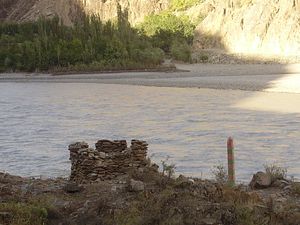On August 26, an airstrike in Afghanistan’s northeastern Takhar province followed a clash between gunmen and Tajik personnel. Details are thin and continue to change, with interested and involved parties — Afghan, Tajik, Russian and Taliban — staking out fairly predictable positions. There remains little clarity about precisely what happened and who was responsible.
Afghan officials have said that a “fighter jet” or helicopter of either Russian or Tajik origin conducted the strike, and that the gunmen were either smugglers or Taliban.
RFE/RL reported that Khalil Asir, spokesman for the Takhar provincial police, said two Tajik border guards were killed in a clash with Taliban. He also said eight Taliban were killed and six wounded. Asir, according to RFE/RL, said the Taliban were killed by two Tajik armed forces helicopters.
Alternatively, Mohammad Jawid Hejri, the provincial governor’s spokesman, said the clash was between drug smugglers and the Tajik border guards. Hejri, however, noted that the area is out of the Afghan government’s control and under that of the Taliban. TOLO News reported Hejri saying that Tajik border forces had fired a number of rockets into the area before “fighter jets” carried out an airstrike.
Tajik officials have denied responsibility for the alleged airstrike, but say that on August 26, two Tajik foresters were killed and a third wounded when their jeep was fired upon from across the border.
An official at the Tajik Ministry of Defense told Asia-Plus, a Tajik news outlet, “We do not have the right to launch air strikes against other countries without consultations with our Collective Security Treaty Organization (CSTO) allies.” The official called Afghan reports about the strike “baseless.”
The Russian Defense Ministry also issued a denial, saying reports that Russian planes had attacked Taliban in Afghanistan “have nothing to do with the reality. Russian military planes have carried out no combat missions in the area of the state border between the Republic of Tajikistan and Afghanistan.”
The Taliban has also weighed in, confirming a clash between drug smugglers and Tajik border guards. According to RFE/RL Zabihullah Mujahid, a Taliban spokesman, said, “We are looking into the incident, as Taliban fighters have no permission to clash with neighboring countries.”
So where does this leave us? Unsatisfied, surely. There appears to have been an initial incident between the Tajik foresters and someone from the other side of the border, whether Taliban, smugglers, or both. This incident then was followed by a retaliatory strike, but there, the details are the thinnest and the denials the strongest. Afghan officials, at least in their initial statements, couldn’t even agree whether the strike was from a helicopter or a fighter jet. This is perhaps an easy mistake to make, imagine the scene: gunfire, helicopters buzzing, a jet overhead, an explosion, all in a district the Afghan government doesn’t even control.
There have been occasional clashes along the Tajik-Afghan border. A Tajik border guard was killed in a December 2017 clash with alleged Afghan drug smugglers at a different part of the border. A similar incident occurred in March 2016. The August 26 incident, however, would be the first time Tajik forces fired into Afghan territory, if that is indeed what happened.
Pulling back, as Eurasianet commented, “This entire episode comes at an awkward time as Moscow plans to host Afghanistan peace talks on September 4.” The September 4 talks were scheduled to bring in the Taliban to Moscow, but both Washington and Kabul rejected invitations to attend.
The timing is now even more awkward as on Monday, a senior official in Afghan President Ashraf Ghani’s office reportedly told Reuters that Sergei Lavrov, the Russian foreign minister, had spoken with Ghani by phone and said the meeting’s date “will be changed to ensure Afghanistan’s participation.”
In the end, we have little concrete information about the August 26 strike near the Afghan-Tajik border, but it’s worth keeping in mind as time progresses. If, for example, this was a retaliatory strike by Tajikistan on Afghan soil, it marks an escalation for Dushanbe and may presage future actions.

































